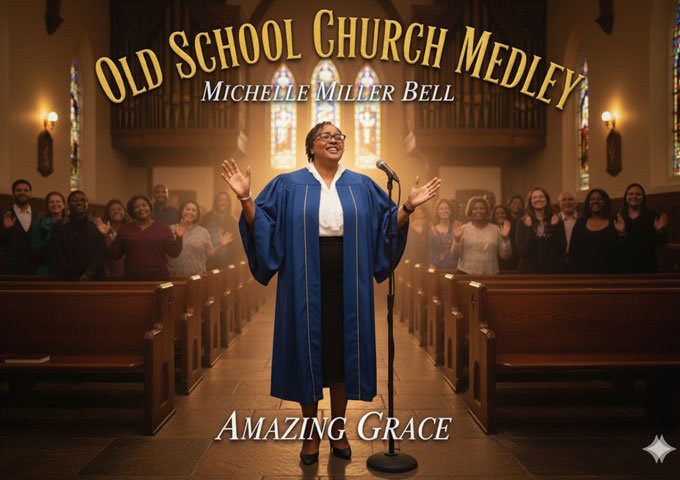When Michelle Miller Bell steps up to a microphone, she does more than sing – she testifies. Her voice carries the weight of history, the pulse of the present, and the unwavering hope of the faithful. On her latest release, “Old School Church Medley – Amazing Grace,” the gifted National Gospel Recording Artist channels the full force of her “Beta Music” style – an electric fusion of classic Soul, R&B, and contemporary Gospel with a funk-laced undertone – into a performance that feels both deeply rooted and spiritually untamed.
Born in Chicago, now based in Lansing, Michigan, Michelle Miller Bell is no stranger to the sanctified fire of church music. She discovered her voice early, at the tender age of twelve, pounding the drums and lifting her voice in the same small church that would later shape her dual calling as both singer and preacher. The church taught her more than melody – it taught her ministry. It’s that same sense of sacred purpose that infuses every breath of “Old School Church Medley – Amazing Grace.”
The song opens with a musical strut that immediately commands attention – funky guitars riffing with gospel grit, radiant horns glowing like Sunday morning sunlight, and keys that shimmer with divine energy. There’s movement in every measure, a kind of sanctified groove that could make even the most stoic listener sway from side to side. Beneath the rhythm, you can feel the bones of the “old school church” – the foot stomps, the tambourine claps, the joyful cries of believers caught up in the Spirit.
This isn’t a quiet reflection on grace; it’s a celebration of it. Michelle doesn’t whisper her faith; she roars it, delivering a vocal performance that blurs the line between artistry and anointing. Every note is charged with conviction. Every inflection feels like a prayer answered in real time.
Her husband, Michael Bell – producer, label CEO, and fellow vocalist — joins her on the track, providing tender, soulful counterpoints to her powerful lead. His smooth phrasing acts as the calm within Michelle’s storm, creating a gorgeous contrast that gives the song emotional texture. Together, they form not just a musical duo, but a living testimony to faith, partnership, and divine purpose.
When Michelle Miller Bell sings, she doesn’t merely perform – she ministers. Her 2020 Vogma Award win cemented her reputation as one of gospel music’s most dynamic voices, capable of moving seamlessly between fiery praise anthems and soulful ballads of worship. But “Old School Church Medley – Amazing Grace” may be her most transcendent recording to date.
Here, her voice rises like a clarion call to righteousness – unflinching, expressive, and gloriously free. She hits note after miraculous note, holding each with fearless control and a kind of divine abandon. There’s no distance between singer and listener; Michelle collapses that gap through sheer conviction. You don’t just hear her voice – you feel it moving through you, reverberating like an altar call echoing through the soul.
Her delivery channels the lineage of gospel greats – from Mahalia Jackson’s thunderous praise to Aretha Franklin’s sanctified soul – yet Michelle’s tone is unmistakably her own. She marries the technical precision of a seasoned vocalist with the raw emotion of a believer who’s been through the fire and come out purified.

To reinterpret “Amazing Grace” is to step into sacred territory. Written by John Newton in 1773, the hymn’s origins are as complex as its message is timeless. Newton, once a captain in the Atlantic slave trade, experienced a radical conversion that led him to reject his past and devote his life to ministry. The lyrics of “Amazing Grace” – “I once was lost, but now am found; was blind, but now I see” – have since become a universal prayer for redemption, sung across generations and cultures.
Michelle Miller Bell approaches this legacy not as a historian, but as a vessel. She doesn’t simply cover the hymn; she revives it. Her interpretation isn’t about reverence alone – it’s about reclamation. She turns the song’s message of deliverance into something personal, communal, and joyously alive.
In her hands, grace isn’t a distant theological concept – it’s felt. It’s the shout after the struggle, the praise after the pain. Her voice becomes the embodiment of Newton’s revelation: that grace, once received, demands to be celebrated.
True to its title, “Old School Church Medley – Amazing Grace” doesn’t limit itself to one mood. Instead, Michelle crafts a seamless medley that feels like a live church experience captured in high definition. It moves through the ebbs and flows of worship – from rousing exaltation to intimate reflection – reminding listeners of how gospel music once functioned as both communal ritual and emotional release.
The arrangement is a masterclass in modern gospel production. Funky guitar licks give the medley a kinetic pulse, while bright brass accents add jubilation. The rhythm section drives forward with purpose, grounding the performance in groove and grit. Over it all, Michelle’s lead vocals soar, supported by richly layered harmonies that shimmer like a choir on fire.
Every element – from the radiant instrumentation to the spirited call-and-response energy – evokes the joyful chaos of a packed Sunday service. You can practically hear the congregation shouting “Amen!” after each line.
Beneath its vibrant energy lies a profound emotional architecture. Michelle’s phrasing draws attention to the spiritual paradox at the heart of “Amazing Grace” – that salvation is both a gift and a reckoning. She sings as one who has known struggle and tasted deliverance. The inflections of her voice – the rise, the break, the release – suggest a lifetime of faith tested and reaffirmed.

Rather than simply recounting Newton’s story, Michelle embodies its message in her own terms. The listener senses the years of ministry behind her tone – the empathy of someone who has prayed for others, cried with them, and seen God’s mercy manifest in unexpected ways.
By the time the song reaches its final crescendo, the performance transcends genre. It becomes something elemental – a shared catharsis between artist and audience, a moment of communal grace.
It’s impossible to speak of “Old School Church Medley – Amazing Grace” without acknowledging the creative partnership at its core. Michael Bell, both husband and producer, provides the steady hand guiding the song’s musical direction. His presence on the track – as both a vocalist and a producer – highlights the synergy that defines their collaboration.
Where Michelle brings fire, Michael brings flow. His voice, smooth and grounding, acts like a bridge between the song’s exuberant highs and reflective lows. Together, they achieve something rare in gospel duets – a genuine dialogue between faith and feeling, masculine and feminine, testimony and tenderness.
The sign of true artistry lies in its aftermath – in the echo it leaves behind. And Michelle Miller Bell always leaves a mark. First, on the music itself, bending it to her emotional will; then on the listener, who walks away transformed, uplifted, and renewed.
“Old School Church Medley – Amazing Grace” isn’t merely a modern reimagining of a beloved hymn – it’s a revival of the spirit that first gave gospel music its power. It reminds us that grace isn’t an old idea; it’s a living force that moves through rhythm, voice, and faith.
Michelle Miller Bell doesn’t just sing about that grace. She embodies it. With every soaring phrase, every hallelujah-infused note, she reminds us why gospel endures – because it speaks to the soul’s deepest need: to be seen, forgiven, and set free.
And as her final notes ring out – radiant, triumphant, unstoppable – one truth becomes clear: Michelle Miller Bell doesn’t just perform gospel music. She is gospel music. “Old School Church Medley – Amazing Grace” by Michelle Miller Bell, featuring Michael Bell, is available now on all major streaming platforms.
OFFICIAL LINKS:
https://michellemiller-bell.com/
https://www.facebook.com/MichelleMillerBell2/
https://www.instagram.com/michellemillerbell/
https://artists.landr.com/057829749528












No Comment